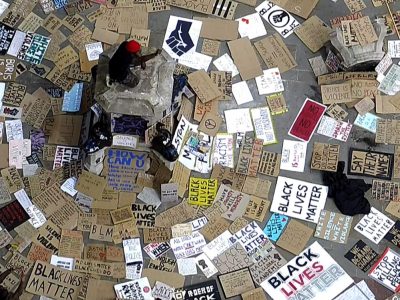Are theatres moving online a blessing for new talent?

As the curtains close on theatres in the UK, Pearl’s been enjoying more online opportunities
Theatres across the country have gone dark. In a city like Bristol, which is home to the oldest continuously working theatre in the English-speaking world, the Bristol Old Vic, and a host of thriving fringe venues like The Wardrobe Theatre and Alma Tavern, this could easily be disheartening news for emerging creatives. Yet with a sudden flurry of online show streams, free workshops on Zoom and virtual Q&As, the industry strangely feels more accessible than ever before. This has particularly been to the benefit of regional theatremakers, including those of us based around Bristol, and aspiring actors, writers and directors who face financial barriers to breaking into the industry. But will theatre become so unrecognisable that this all becomes fruitless anyway?
With a sudden flurry of online show streams, free workshops on Zoom and virtual Q&As, the industry strangely feels more accessible than ever before.
Bristol, despite being recognised as one of the country’s great theatrical cities, still suffers from being ‘Not London’. The size of our capital, as well as the historically disproportionate level of Arts Council funding directed into the city – 40% of its National Portfolio Organisations in the current four-year cycle are in London, the lowest percentage since 2012 – means that there are simply more opportunities for those trying to carve out creative careers in London than any other city. This not only exacerbates but is a cause in itself of the financial barriers that stand in the way of success in an industry in which the middle class still dominate. Many cannot afford London living costs and are therefore unable to access training, development schemes and even jobs that require moving there. Regional creatives without a family home in the capital are therefore at a significant disadvantage.
But will theatre become so unrecognisable that this all becomes fruitless anyway?
But this is not solely a problem in London. In regional hubs like Bristol, someone may wish to attend a free workshop, for example, but if this requires buying a bus ticket from Hartcliffe to the city centre (£5 on the bus), or even a train ticket from Weston-super-Mare (an average of £7.50), this workshop is no longer actually free for them to attend. Although the intentions of the organisation hosting the workshop are good, the reality is that unless you live within walking or cycling distance of the venue, you cannot access this opportunity without spending money, and the amount someone can afford to spare to attend a workshop is relative. In order to counter the cost of travel to cultural hubs preventing people from accessing these opportunities, theatres – particularly those that are publicly funded – must either offer to pay participants’ travel expenses or host workshops, auditions and more in a greater variety of locations.
Although the intentions of the organisation hosting the workshop are good, the reality is you cannot access this opportunity without spending money.
The national lockdown caused by the Coronavirus outbreak, though, has changed things. Scheduled events were quickly reprogrammed online, and an increasing amount of online opportunities are being created specifically in response to the current situation. Suddenly, all that’s required to benefit from opportunities such as those listed below is internet access. Although of little use to those in households without home hubs or rural areas with poor broadband coverage – which should not be ignored – this provides, for the first time, unprecedently equal access to the industry for emerging theatremakers.
Suddenly, all that’s required to benefit from opportunities such as those listed below is internet access.
The National Student Drama Festival (NSDF) was at the forefront of this shift. Opening on the 4th April, the festival completed its intended run with much of its original programme still taking place, albeit via Zoom. Virtual attendees had the opportunity to learn from leading lights of the industry, including renowned playwright Winsome Pinnock, BAFTA-nominated actress Joanna Scanlan and director Emma Rice, who is well known to Bristolian theatregoers. A quick scroll through Twitter shows that the initial flurry of online opportunities has continued week after week in lockdown, and the BBC, the BFI and Paines Plough have all organised virtual Q&As for us to enjoy from the comfort of our own homes. The necessity of holding these events remotely highlights the sheer number of potential participants who were previously held back by location, finance and other issues.
The necessity of holding these events remotely highlights the sheer number of potential participants who were previously held back by location, finance and other issues.
There is an odd parallel to all this, however. While the heart of the theatre may not be bricks and mortar, it is hard to imagine a future where physical venues – spaces where audiences come together to share an ephemeral experience – do not remain the primary source of opportunities, income and prestige. Even before the current crisis theatres faced mounting financial pressures, with regional theatres the hardest hit. Now, those of us hoping to make a living from telling stories in these spaces are faced with uncertainty as to the survival of many buildings, from the smaller fringe venues where we tend to cut our teeth to bigger, more established names, with Nuffield Southampton Theatres having gone into administration.
Emerging theatremakers, particularly those in the regions and/or from low socioeconomic backgrounds, have found the industry more receptive to their needs as lockdown events launch online, and with a wealth of online opportunities offering both training and networking, it can seem like a good time to be on the cusp of a creative career. But with speculation ongoing as to when ‘theatre’ – as we are used to it – can resume, for now, even optimists may have to consider how to continue to make and showcase their work remotely.
OPPORTUNITIES
For a comprehensive round-up of open script submission windows (all free-to-enter), head to https://www.bbc.co.uk/writersroom/opportunities
Bristol Old Vic has announced it will extend the submission period of its annual Open Session, where it invites full-length scripts from playwrights in the South West. Details of this and its emergency support for artists can be found at https://bristololdvic.org.uk/for-artists
The BFI Film Academy is running Virtual Labs monthly, for those interested in screenwriting and filmmaking. Sessions are announced here.
Have you been benefitting from theatres moving their work online? Let us know in the comments.







